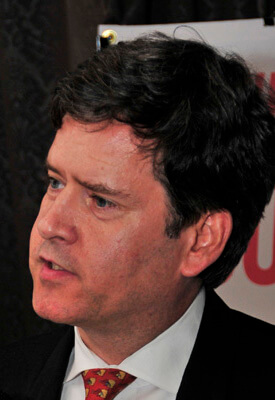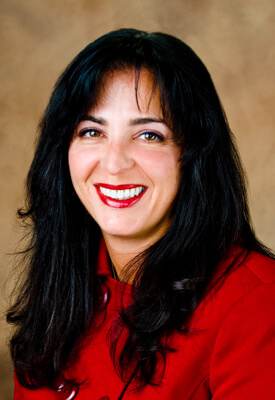Staten Island Democrat Diane Savino, a strong supporter of LGBT issues, is not making public her position in the Senate leadership fight and what conditions she might make on Republicans if she supports their continued control. | NEW YORK STATE SENATE
Democrats in the New York State Senate looked to have won a surprise majority on Election Day, overcoming a huge financial disadvantage, Republican gerrymandering, and no help from Democratic Governor Andrew Cuomo. But that prospective majority has been put in jeopardy –– and, along with it, the fate of much progressive legislation, including a long-stalled transgender rights bill, the Gender Expression Non-Discrimination Act (GENDA) –– as Democratic senators defect or threaten to in the fight over who will become the majority leader. Republicans have held that post in all but two years over a period dating back more than 40.
Senator-Elect Brad Hoylman, a Lower Manhattan Democrat who is succeeding Tom Duane and will be the only out gay member of the Senate, said, “It is extremely important for GENDA that the Democratic majority holds –– along with other issues including funding for LGBT and AIDS services.”
In the 63 Senate races, 31 Democrats and 30 Republicans have been certified as winners and Democrats lead in the two outstanding contests upstate. But one newly elected Democrat, social conservative Simcha Felder of Brooklyn, has already bolted, saying he will caucus with the Republicans to re-elect Long Island’s Dean Skelos as majority leader.
Four other Democratic senators, led by Jeff Klein of the Bronx, have been calling themselves the Independent Democratic Caucus (IDC) and will not declare themselves in the leadership fight. Klein’s IDC colleagues are Diane Savino of Staten Island, who is also his longtime partner, David Valesky of Syracuse, and David Carlucci of Rockland County. The four all have pro-gay voting records, but since they are not talking, it is unclear whether any deal they would make to join with the Republicans to run the Senate would include assurances about the passage of GENDA or anything else of concern to the LGBT community.
The fight is a replay of the 2009 defection of several Democratic members among the self-styled Four Amigos, who were led by the Bronx’s Pedro Espada, who is now headed for prison after a corruption conviction. Espada and Queens Senator Hiram Monserrate, who at the time was facing domestic violence charges of which he was eventually convicted, left the first Democratic majority in the Senate since the 1960s, returning power to the GOP. After months of chaos, the Democrats lured them back in a deal that gave Espada the number two post in the Senate, a position he used to thwart tenant legislation opposed by the landlord lobby that had funded the coup.
Senator-Elect Brad Hoylman, an out gay Democrat, pledges to fight for his party in the leadership battle. | DONNA ACETO
Hoylman said Felder’s defection was “not a surprise.” He hopes the IDC will stay within the larger Democratic caucus, but pledged he would not support the sort of deal employed to get Espada back in the fold.
“The conference should not be subject to hostage-taking,” Hoylman said.
Unlike his predecessors Eliot Spitzer and David Paterson, Cuomo –– who is supposed to be the leader of his party in New York –– did not work for a Democratic majority in the Senate, is widely seen to be more comfortable with the business-oriented conservative Republican majority, endorsed some Republicans, and has said he expects “a coalition” to be in charge of the Senate in January.
As this story has unfolded, still more Democrats are rumored to be looking to make deals with the Republicans, including former Democratic Majority Leader Malcolm Smith of Queens and right-wing Bronx Senator Ruben Diaz, Sr., whose son, Bronx Borough President Ruben Diaz, Jr., just condemned his predecessor, Adolfo Carrión, for becoming a Republican to run for mayor next year. Diaz, Sr., is the Senate’s most vocally implacable foe of the LGBT community.
Despite the threat to GENDA from this leadership fight, the Empire State Pride Agenda’s new executive director, Nathan Schaefer, whose group calls the bill its top priority, said in an email, “We are not involved in the deliberations regarding Senate leadership. Our strategy has not changed one iota. We continue to work with legislators on both sides of the aisle, all across the state, to build support for priorities such as a transgender nondiscrimination law and funding for LGBT health and human services.”
The Pride Agenda refused to provide a count of the Democrats and Republicans who have committed to them to vote for GENDA, though transgender activist Melissa Sklarz, president of the Stonewall Democratic Club of New York City, said all the current Democratic senators support it except Diaz and, presumably, newcomer Felder. In 2010, Diaz joined a unanimous GOP bloc on the Judiciary Committee in preventing GENDA from getting a floor vote.
Sklarz is hoping the IDC stays in the Democratic column for the sake of GENDA, but said the “second best option” would be for “Skelos to depend on the IDC” informally, and the worst option would be “a Republican majority.” Neither she nor any of the other advocates for GENDA appear to have worked on getting a commitment from the IDC that they will insist the bill be sent down for a floor vote if they make a power-sharing deal.
While Sklarz commended Cuomo for making GENDA “a priority,” she would not comment on his support for Senate Republicans or his expectations of a coalition leadership.
The Senate majority leader wields enormous power over what bills get a vote. And while Republican leaders have eventually allowed votes on gay issues, it took 42 years for one to permit a vote on a bill banning discrimination based on sexual orientation and 11 years in the case of the hate crimes bill –– in both instances long after the Democrat-led Assembly had passed them. Skelos allowed the marriage equality bill out in 2011, with all but four of his members voting against it and only one of that quartet –– Mark Grisanti of Buffalo –– likely to return in January. (One did not run for re-election, Roy McDonald of Saratoga lost his primary, and Stephen Saland of Poughkeepsie, after narrowly surviving a primary challenge, is running behind a Democrat, Terry Gipson, in a contested count.)
Most of the negotiations over the Senate leadership are happening quietly behind closed doors, with few Democratic leaders stepping forward to demand that their Democratic colleagues do something as basic as elect a leader from their own party or face consequences. The Working Families Party is said to be planning rallies around the state to get the rogue members in line.
And the new Brooklyn Democratic chairman, Frank Seddio, has said he is looking for a way to expel Felder from the party for his treachery. Seddio is scheduled to speak to the Stonewall Democratic Club at the LGBT Community Center at 8 p.m. on November 28. Joined by Democratic political operative Hank Sheinkopf, Seddio will talk about the 2012 election results and prospects in next year’s municipal elections for mayor, City Council, and other offices.
Veteran gay activist Allen Roskoff praised Seddio for his tough stance. “Now I’d like to see the Democratic leader of the state, Andrew Cuomo, do the same,” he said.
Roskoff said he will recommend that the Jim Owles Liberal Democratic Club, of which he is president, “dissociate itself from any elected Democrat who stands in the way of the Democratic Party controlling the State Senate.”
The club’s board of governors includes Savino, an IDC member who has yet to declare herself in the leadership fight.

































